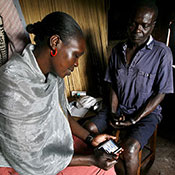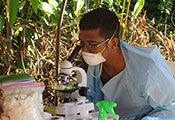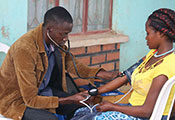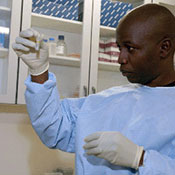|

|
|
September / October 2019 |
|
Fogarty and its partners from across NIH plan to award $5 million to support innovative exploratory and developmental mobile health research in low- and middle-income countries through Fogarty’s Mobile Health: Technology and Outcomes program.
|

|
|
With support from the NIH-NSF Ecology and Evolution of Infectious Diseases Initiative, a new project will help develop and apply new frameworks for predicting the spread of zoonotic diseases.
|
 |
|
To bolster promising global health research careers, Fogarty and its partners are awarding $9.9 million through two career development programs. Recipients will study a variety of health-related disciplines, including tuberculosis and other infectious diseases.
|

|
|
Fogarty Director Dr. Roger I. Glass discusses how the Rakai Health Sciences Program in Uganda, which is marking its 30th anniversary this year, has played a vital role in preparing low- and middle-income country scientists for the battle against HIV/AIDS.
|
 |
|
Dr. Simani Gaseitsiwe of the Botswana Harvard Partnership discusses his Fogarty training, his approach to mentoring, and the importance of building local research capacity.
|
 |
|
Africa’s unique context and health care challenges would benefit from specially tailored technology solutions, rather than its current reliance on imports from industrialized nations. Appropriately designed technologies can be used in the prevention, diagnosis, monitoring and treatment of disease, which can save lives as well as money.
To meet that need, the continent must develop its own biomedical engineers who are familiar with local needs and resource constraints, according to Biomedical Engineering for Africa, a book published recently by Fogarty grantees and collaborators.
|



|
|
Also in this issue
Profile: Fogarty Fellow uses legal skills to study human rights and HIV/AIDS in Kenya
Neiloy Sircar, the first lawyer to participate in Fogarty’s Global Health Fellows and Scholars program, examined consent, privacy and confidentiality as part of Kenya's strategy to control HIV and link more people with treatment. WHO calls for more research into microplastics pollution
The WHO has released an assessment on microplastics in drinking water that suggests current levels aren’t a human health risk, but more research is needed. People in the news:
- Former NLM Director Dr. Donald A.B. Lindberg dies
- Environmental health director Dr. Linda S. Birnbaum is retiring
- Dr. Debara L. Tucci to lead deafness institute
- Dr. Richard Benson is new global health head for NIH neurological institute
- Winnie Byanyima chosen to lead UNAIDS
- Dr. Charles Rotimi recognized for human genetics research
- Dr. Michele Ramsay is among distinguished women researchers
- New academic role for grantee Dr. Carey Farquhar
- Dr. Ann Cashion retires from NIH nursing institute
- Details: People in the news
Global health briefs:
- NIH Director publishes innovation forecast
- NICHD launches strategic plan
- NIMH unveils research toolbox
- WHO reports on HIV drug resistance
- Report from WHO says better nutrition saves lives
- Global pandemic preparedness lacking
- Details: Global health briefs
E-news extras
- News for Fogarty and NIH grant applicants and grantees
- News and publications featuring Fogarty staff
- A systematic review and evaluation of Zika virus forecasting and prediction research during a public health emergency of international concern [Open access], co-authored by Fogarty's Dr Cecile Viboud
PLOS Neglected Tropical Diseases, October 4, 2019
- Molecular characterization of respiratory syncytial viruses circulating in a paediatric cohort in Amman, Jordan [Open access], co-authored by Fogarty scientists
Microbial Genomics, September 18, 2019
- Ebola in Zaire, 1976: The Past as Prologue [Video],
featuring Fogarty senior scientist emeritus Dr. Joel Breman
CDC, September 5, 2019
- Interview with NIH Fogarty International Center Director Dr. Roger Glass [PDF]
American Thoracic Society Research News Quarterly, September 2019
- Fogarty and NIH grantee news
- NIH global health research news
- Drug reverses signs of liver disease in people living with HIV
NIAID/NIH news, October 11, 2019
- In women with HIV, TB preventive therapy poses greater risk in pregnancy than postpartum
NIAID/NIH news, October 2, 2019
- NIH researchers create new viral vector for improved gene therapy in sickle cell disease
NHLBI/NIH news, October 2, 2019
- Study assesses asthma treatment options in African American children and adults
NHLBI/NIH news, September 25, 2019
- NIH-hosted workshop: HIV-associated Comorbidities, Co-infections and Complications:
Recorded webcast Day 1 - September 19, 2019
Recorded webcast Day 2 - September 20, 2019
- Today's faces of sickle cell disease: [African Postdoctoral Training Initiative Fellow] Kolapo Oyebola, PhD
NHLBI news, September 19, 2019
- Uncovering a hidden Zika outbreak in Cuba
Blog post by NIH Director Dr. Francis S. Collins, September 3, 2019
- Tracing Zika's genetic history
NIAID Now blog, August 28, 2019
- Graphene shield shows promise in blocking mosquito bites
NIH-funded project shows graphene could provide alternative to chemicals in insect repellant and protective clothing
NIEHS/NIH news, August 26, 2019
- Other global health research news
- More global health research news from Fogarty
|
Funding opportunities
Global Brain and Nervous System Disorders Research Across the Lifespan
Application deadline: November 7, 2019 Emerging Global Leader Award
Application deadline: November 7, 2019 Reducing Stigma to Improve HIV/AIDS Prevention, Treatment and Care in LMICs
Application deadline: November 12, 2019 Chronic, Noncommunicable Diseases and Disorders Research Training
Application deadline: November 12, 2019 Global Infectious Disease Research Training
Application deadline: November 12, 2019 Mobile Health: Technology and Outcomes in Low and Middle Income Countries
Application deadline: November 19, 2019
AIDS application deadline: December 3, 2019 Ecology and Evolution of Infectious Diseases (EEID)
Application deadline: November 20, 2019 African Postdoctoral Training Initiative (APTI)
Application deadline: December 1, 2019 Heart, Lung, and Blood Co-morbiditieS Implementation Models in People Living with HIV (HLB SIMPLe) Phased Awards (RFA-HL-20-025) and Research Coordinating Center (RFA-HL-20-026)
Application deadline: December 10, 2019 Global Noncommunicable Diseases and Injury Research
Application deadline: December 13, 2019 All Fogarty funding opportunities Subscribe to NIH global health funding opportunities email alerts
|
Upcoming events
November 5 - 7, 2019
Clean Cooking Forum
Nairobi, Kenya November 6 - 8, 2019
NIH Regional Seminar on Program Funding and Grants Administration
Phoenix, AZ November 20 - 24, 2019
American Society of Tropical Medicine and Hygiene (ASTMH) Annual Meeting
National Harbor, MD December 4 - 6, 2019
Conference on the Science of Dissemination and Implementation in Health
Co-sponsored by AcademyHealth and NIH
Arlington, VA December 6, 2019
Global Health Landscape Symposium
Washington, DC February 11, 2020
Fogarty Advisory Board Meeting Open Session
NIH campus
Bethesda, MD April 17 - 20, 2020
Consortium of Universities for Global Health (CUGH) Annual Conference
Washington, DC Fogarty calendar of events
Connect with Fogarty
 Fogarty on Facebook | Fogarty on Facebook |  Fogarty on Twitter | Fogarty on Twitter |  Subscribe Subscribe
|
|
Global Health Matters is produced by the Office of Communications at the National Institutes of Health's Fogarty International Center. For more information, please contact managing editor Ann Puderbaugh at ann.puderbaugh@nih.gov or 301-496-2075.
Permission to reprint Global Health Matters content: All text produced in this newsletter is in the public domain and may be reprinted. Please credit Fogarty International Center. Images must be cleared for use with the individual sources, as indicated.
The Fogarty International Center, the international component of the U.S. National Institutes of Health, addresses global health challenges through innovative and collaborative research and training programs and supports and advances the NIH mission through international partnerships.
Subscribe, update your subscription or unsubscribe to this e-newsletter from the Fogarty International Center subscription page. We encourage you to forward this e-newsletter to colleagues who may find it of interest. |
|








